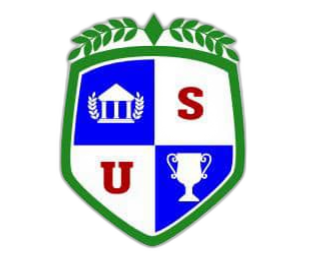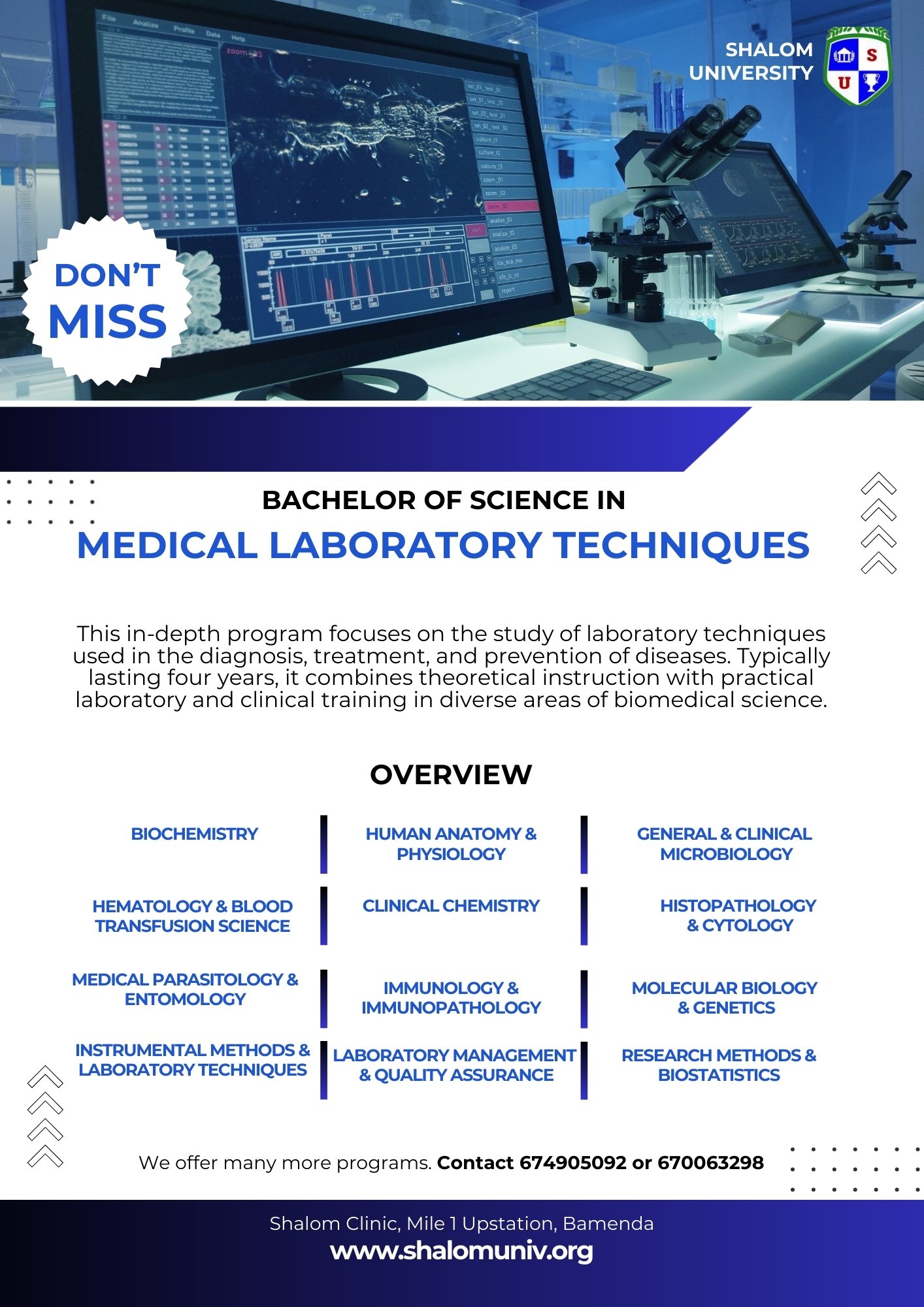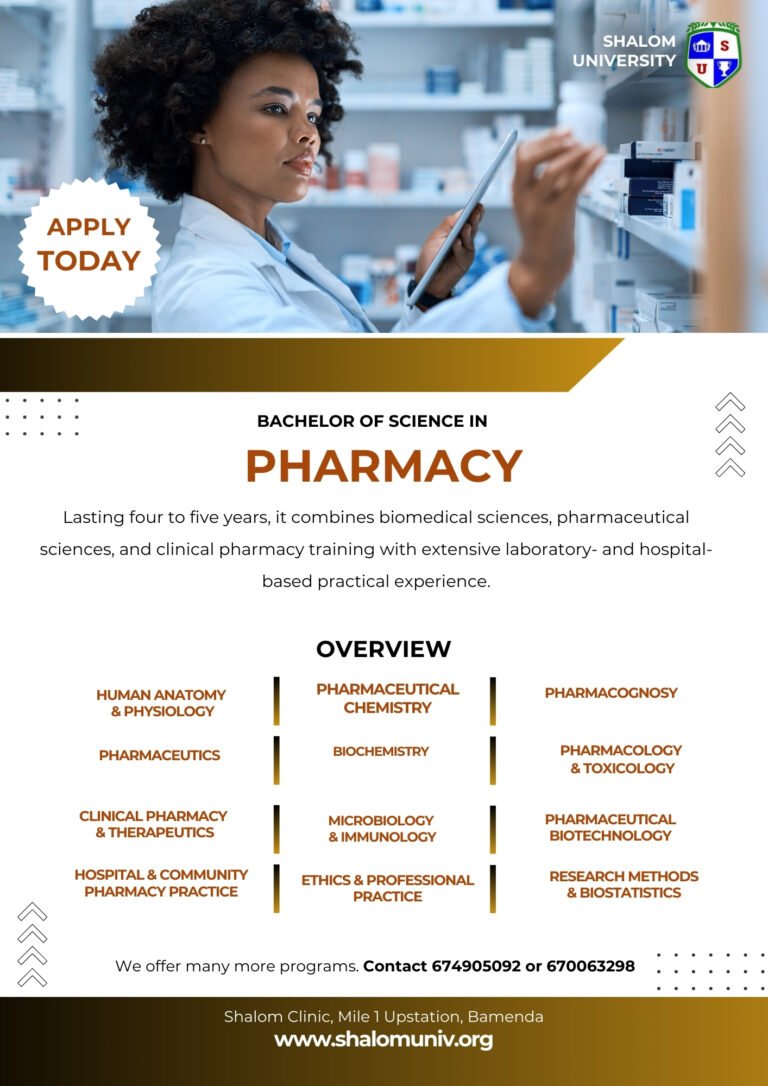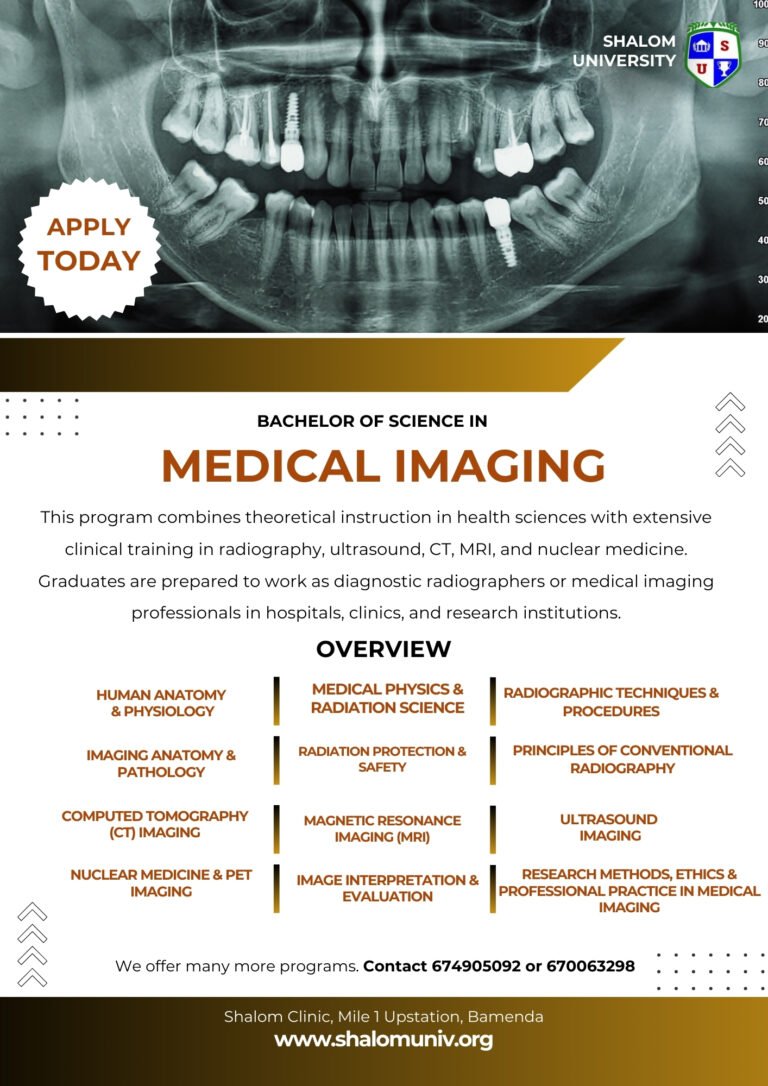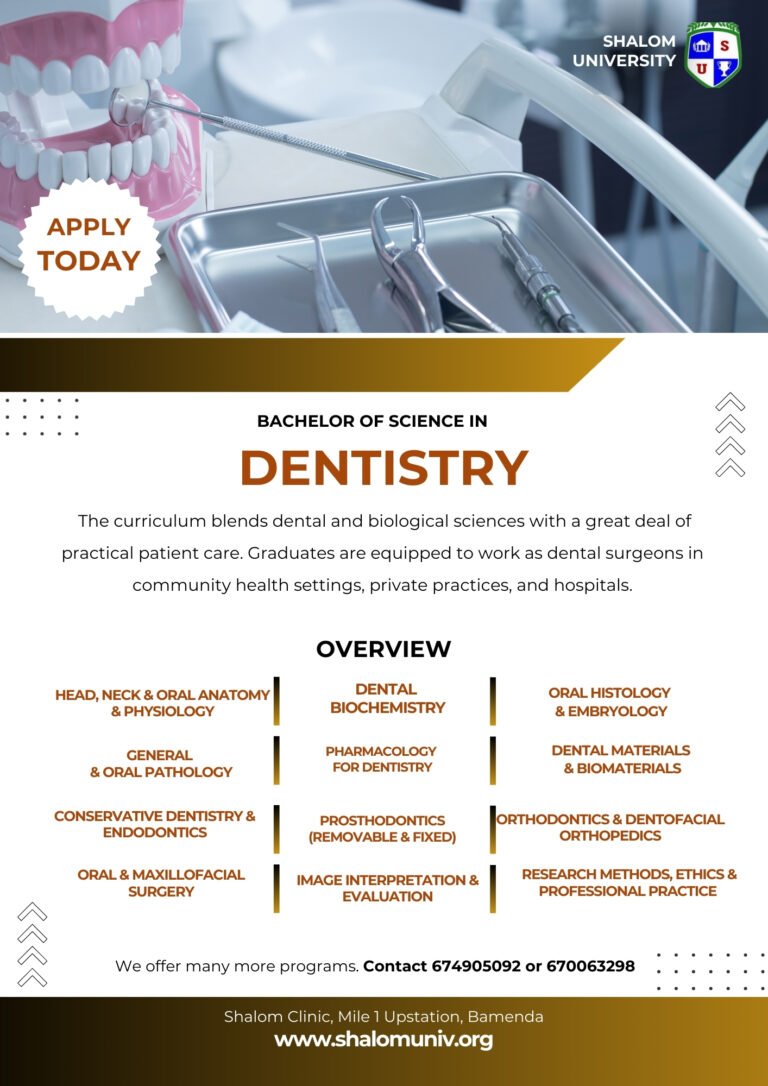In modern healthcare, accurate diagnosis is the cornerstone of effective treatment. Behind every diagnosis, there are skilled professionals working tirelessly in laboratories to ensure that patients receive the right care at the right time. This Bachelor of Science (BSc) in Medical Laboratory Science is designed to train the next generation of laboratory scientists with the knowledge, technical expertise, and ethical grounding required to support clinical decision-making and public health initiatives.
This program integrates theoretical foundations in biomedical sciences, laboratory practice, research, and management skills. By combining classroom instruction with hands-on laboratory training, the BSc in Medical Laboratory Science prepares graduates for diverse roles in clinical laboratories, research institutions, biotechnology, and public health systems.
Below, we’ll explore the core courses and learning outcomes of the program.
Human Anatomy & Physiology
Students begin with a detailed study of the structure and function of the human body. This course provides the foundation for understanding how diseases affect organs, tissues, and systems. It covers musculoskeletal, cardiovascular, respiratory, reproductive, and nervous systems, emphasizing clinical relevance in laboratory diagnostics.
Biochemistry
This module delves into biochemical processes, metabolic pathways, and molecular interactions that underpin human health. Students explore proteins, carbohydrates, lipids, enzymes, and hormones, learning how biochemical imbalances manifest as disease. This knowledge is essential for interpreting results in clinical chemistry and diagnostic biochemistry.
General & Clinical Microbiology
Microbiology is central to laboratory science. Students study the structure, physiology, and genetics of microorganisms, including bacteria, viruses, fungi, and parasites. Clinical microbiology emphasizes laboratory methods for isolation, identification, and antimicrobial susceptibility testing, preparing students to combat infectious diseases.
Hematology & Blood Transfusion Science
This course focuses on the study of blood, blood disorders, and transfusion medicine. Students learn diagnostic techniques for anemia, leukemia, and clotting disorders, along with safe practices in blood banking and transfusion. Practical skills in complete blood counts, blood typing, and crossmatching are emphasized.
Clinical Chemistry
Clinical chemistry bridges laboratory science and patient care. Students analyze body fluids such as blood, urine, and cerebrospinal fluid to detect abnormalities in electrolytes, enzymes, hormones, and metabolites. This course trains students in quality control, automation, and result interpretation for clinical diagnosis.
Histopathology & Cytology
This module explores tissue and cell analysis for the detection of disease. Students learn techniques in biopsy preparation, staining, and microscopic evaluation, enabling them to identify cancers, infections, and degenerative diseases. Cytology adds expertise in the study of individual cells, particularly for cancer screening.
Medical Parasitology & Entomology
Students study parasites and vectors of medical importance, their life cycles, modes of transmission, and associated diseases. This includes protozoa, helminths, and arthropods. Laboratory techniques for parasite detection and vector identification are emphasized, along with strategies for disease control in communities.
Immunology & Immunopathology
This course provides a comprehensive overview of the immune system and its role in health and disease. Students learn about immune responses, autoimmune disorders, hypersensitivity reactions, immunodeficiencies, and vaccine development. Laboratory skills include serological testing, ELISA, and immunofluorescence assays.
Molecular Biology & Genetics
Modern diagnostics are increasingly reliant on molecular techniques. Students explore DNA replication, gene expression, genetic disorders, and molecular diagnostics, including PCR and sequencing methods. The course also highlights the role of genetics in personalized medicine and biomedical research.
Instrumental Methods & Laboratory Techniques
Hands-on laboratory proficiency is essential. Students are trained in the use of microscopes, spectrophotometers, centrifuges, chromatographs, and advanced diagnostic analyzers. Emphasis is placed on laboratory safety, automation, and the maintenance of diagnostic equipment.
Laboratory Management & Quality Assurance
Successful laboratories depend on effective management. This course covers laboratory organization, quality control, biosafety, accreditation standards, and ethics. Students are prepared to assume supervisory roles, ensuring that laboratory practices meet international quality benchmarks.
Research Methods & Biostatistics
Evidence-based practice drives laboratory medicine forward. Students develop skills in study design, hypothesis testing, statistical analysis, and data interpretation. The course prepares them to conduct independent research and critically evaluate scientific literature, culminating in a capstone project or thesis.
Career Opportunities in Medical Laboratory Science
Graduates of the BSc in Medical Laboratory Science at Shalom University can pursue careers in:
- Clinical Laboratories – Hospitals, diagnostic centers, and reference labs.
- Public Health Agencies – Disease surveillance, outbreak investigations, and national health programs.
- Research Institutions – Biomedical research, pharmaceutical development, and academic careers.
- Biotechnology & Molecular Diagnostics – Emerging fields such as genetic testing and personalized medicine.
- Blood Banks & Transfusion Centers – Ensuring safe blood supply for hospitals.
Additionally, graduates may pursue advanced degrees (MSc or PhD) in areas such as microbiology, immunology, hematology, or molecular medicine.
Why Choose Shalom University for Medical Laboratory Science?
- Comprehensive Curriculum – Covering all key diagnostic sciences.
- Practical Training – State-of-the-art laboratories and clinical attachments.
- Experienced Faculty – Experts in laboratory medicine and biomedical sciences.
- Research Opportunities – Students engage in impactful projects addressing community health challenges.
- Global Relevance – The program aligns with WHO and international diagnostic standards.
Learn more about the BSc in Medical Laboratory Science at Shalom University.
Frequently Asked Questions (FAQ)
Q1: What is the duration of the BSc in Medical Laboratory Science at Shalom University?
A: The program is typically completed in four years of full-time study, including laboratory rotations and research projects.
Q2: What are the entry requirements?
A: Applicants must have a high school diploma with strong performance in science subjects such as biology and chemistry. Additional requirements may apply for international students.
Q3: Does the program include clinical training?
A: Yes. Students undergo hands-on training in hospital and diagnostic laboratories, gaining real-world experience in medical testing.
Q4: What career options are available after graduation?
A: Graduates can work in clinical laboratories, public health agencies, research centers, biotechnology companies, and academic institutions.
Q5: Why study Medical Laboratory Science at Shalom University?
A: The program combines academic rigor, practical experience, ethical training, and research exposure, making graduates competitive globally.
Final Thoughts
The Bachelor of Science in Medical Laboratory Science at Shalom University is a gateway to a rewarding career in healthcare and biomedical science. With a strong foundation in anatomy, biochemistry, microbiology, hematology, and advanced diagnostic techniques, graduates are well-prepared to improve patient care, support physicians, and contribute to global health innovations.
For students passionate about science, research, and healthcare, this program offers the perfect blend of knowledge, skills, and career opportunities.
